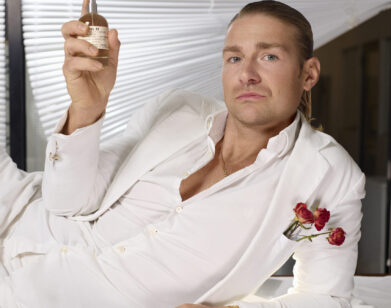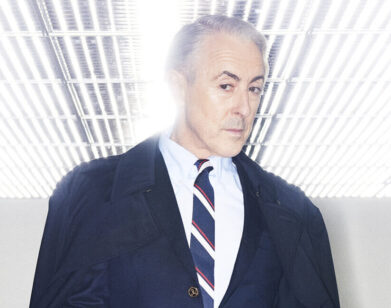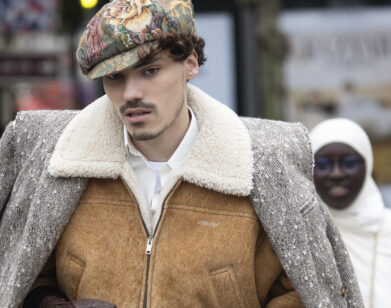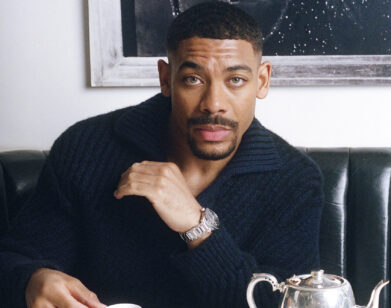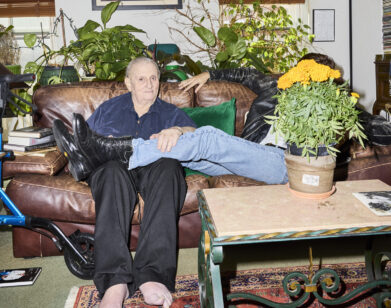PORTFOLIO
Kyle Mooney on Merging AOL Nostalgia and Apocalyptic Mayhem in Y2K
In an era when Hollywood retreads and corporate trends have become the backbone of blockbuster filmmaking, a crop of up-and-coming directors, unburdened by an adherence to Hollywood’s established norms and conventions, are approaching their movies with fresh, uninhibited perspectives. of ignorance in the face of industry conventions. Their work spans traditional genres, from coming-of-age comedies to sports biopics to prestige adaptations. Budgets range from streamer-funded to scraped-together. And while all of this results in different styles of filmmaking, their commonalities are much more salient. To find out why, we asked Eugene Kotlyarenko, filmmaker and host of the Director’s Commentary podcast, to speak with six early-career directors with big dreams and bigger ambitions. In the second of five installments, he talked to Saturday Night Live alumni Kyle Mooney, the director of Y2K, a coming-of-age comedy that asks the question: What would’ve happened if the millenial techpocalypse actually went down?
———
EUGENE KOTLYARENKO: Hello, Kyle.
KYLE MOONEY: Eug! You’re in Australia?
KOTLYARENKO: Yep. SXSW Sydney. I saw Y2K on the big screen with an Australian crowd and we were having a great time.
MOONEY: That’s so fun. And you showed your movie, too?
KOTLYARENKO: Yeah, The Code. I was hiding in the back of the theater and got to hear everyone laughing beginning to end. Even at all the little micro jokes that you wonder if people will get.
MOONEY: That’s great. So is it actually the opposite season there?
KOTLYARENKO: Yep. What I was looking for was the whole thing about the toilet water turning the other way.
MOONEY: Oh, right.
KOTLYARENKO: But honestly, these days, toilet water just gets sucked down. Most toilets don’t spin anymore. We’ve been robbed of so much. So, when I’m watching your film, I’m thinking, “Kyle is the king of nostalgia. He brings back all the beautiful details and hilarious cringe-worthy moments of the past so we can relive them joyously.” Are you and Evan [Winter], your co-writer, just sitting there riffing on stuff from your personal past, or are you guys looking up news pieces about Y2K and reading articles in Time from 1999?
MOONEY: Yeah. I mean, all of it, though I do think that we are both mainly bringing our separate lives from that time period. I’d bring up, “Do you remember this music video or this commercial or this TV show?” And he wouldn’t know it. So that might not make it into the movie. I wanted to be in concert with , “Okay, we both remember this.”
KOTLYARENKO: Inevitably looking back, I think about how influential our childhood is in how we become creative. So going through all that must’ve been a trip. Like the movie starts with the whole AOL log on.
MOONEY: Well, that feels almost Eugene-esque.
KOTLYARENKO: Aww thanks. Seeing that I was like, “Kyle is a man after my own heart.” I mean, the early internet seems like ancient history, but the patterns we set up in that era are at the core of our cultural behavior now.
MOONEY: Yeah, it’s intriguing that we had Instant Messenger and that was the way I communicated with crushes, and I was more outgoing on the computer than I was in real life.
KOTLYARENKO: There were people that I did not exchange a single word with at school during the day and then I’d come home and go on AIM and literally have long conversations with them.
MOONEY: Right, and that feeling of when that door-opening sound happens and we do a version of it in the movie, how excited you were, like, “Oh, shit, so-and-so is on. I’m going to get my flirt on.” There is such an adrenaline rush when that person pops on your buddy list.
KOTLYARENKO: Yeah. It’s the earliest form of online Pavlovian conditioning currently exhausting our souls. [Laughs]. But, yeah, just hearing that DSL modem logging on, it’s the quickest way to set the scene and it comes off really well in the film. And then you’re seeing Eli’s mom, Alicia Silverstone, it’s like, “We’re in good hands here.”
MOONEY: She was so fun. And her with Tim [Heidecker] was a funny coupling of people.
KOTLYARENKO: Have you worked with Tim before?
MOONEY: Yeah, he’s in Brigsby Bear and we’ve become friends. I was thinking about Tim & Eric last night, actually. How meaningful his work is to me.
KOTLYARENKO: They also have a really interesting approach to nostalgia and distorting old references towards the grotesque.
MOONEY: Totally. It’s always special when somebody points the spotlight somewhere you didn’t realize is funny, and they did that with public access. All of this local TV we’ve just been scrolling past is super interesting in its own right.
KOTLYARENKO: And they revolutionized an editing style that’s very unique and surrealist, in a contemporary way. Schizoid.
MOONEY: I feel like immediately after them, you saw it all over the place.
KOTLYARENKO: Exactly. So you have Tim in the mix. But with Alicia, we’re talking about someone who portrayed one of the most iconic coming-of-age characters, Cher in Clueless. And I think clearly here, you’re grappling with that genre.
MOONEY: Yeah, when we would pitch the movie to people, or talking to various department heads, it was always like, “We want this to feel like those grounded coming-of-age movies that we loved,” So I’m glad it hit it for you.
KOTLYARENKO: It did. Not just grounded, but also alt. It’s important to sneak in alternative perspectives for all the kids out there. Like Clueless is set in a very mainstream ’90s milieu, but it has an alternative perspective. I guess another way to sneak it in is using a different era. Y2K is not just nostalgia for people who lived through it. It’s for teenagers now.
MOONEY: I hope so. That’s what Dazed and Confused was for us. It was a way into the ’70s. I’m excited for young people to experience our ’90s universe.
KOTLYARENKO: It also has a little of that Tarantino revisionist history thing where you look back at this seminal historical moment and are like, “Wait, but what if Y2K did happen?” When did that idea come to you?
MOONEY: I’ve always been a little obsessed with Y2K. I remember it was such a letdown, but it still felt significant. There was a shift, but it was invisible. I remember very specifically hanging with my friend, Mark. I think we were high on Coricidin, cold and cough pills. This was probably the year 2000 or 2001, and we were talking about Y2K and we created this mythology that what really happened was at midnight, the reals and the fakes were separated.
KOTLYARENKO: [Laughs] That probably did happen and we’re 24 years into it now.
MOONEY: But the real story behind this idea— it’s very possible that I saw you the night before actually. So I woke up hungover on New Year’s day 2019, and it was just one of those thoughts that pops up and it feels so obvious: “What if Y2K actually happened?” And I created a story about teenagers going to a house party, and at midnight, Y2K happens. I pitched it to Evan pretty immediately and he kept the ball rolling.
KOTLYARENKO: Yeah, I didn’t even think about it, but you are so New Year’s pilled. You are the New Year’s guy. Every year, I can count on the fact that there’s going to be an awesome gathering at your house on New Year’s Eve. So clearly, even that element of the movie is personal to you.
MOONEY: Nobody’s ever called me New Year’s-pilled, so I appreciate that. My thing is, it’s not like I have an intense love for New Year’s Eve, per se. It’s stressful and it never feels seamless or like you’re making the absolute right decision. So I think in the past several years, I’ve just gotten into, along with Kate (Lyn Sheil, Mooney’s wife), let’s do something on our own and not hop around. You know what I mean?
KOTLYARENKO: And thus you became New Year’s-Pilled. But I do ask myself before every movie, “Okay, why is this a movie?” And more often than not, it has something to do with a closed off timeframe. Because if you want to tell a story that feels more open-ended or sprawling, you have a longform medium like streaming. So one night, New Year’s Eve. That’s a movie time frame.
MOONEY: For me, it was just surprising this “Y2K happens” concept hadn’t been done. It feels obvious.
KOTLYARENKO: That’s always the best high-concept stuff, where you’re like, “How has nobody done this before?” And then that actually gives you the incredible sense of urgency as a storyteller to be like, “Okay, I have to get this out there now.”
MOONEY: Yeah. It took us about a year to have a draft that we were pretty excited about.
KOTLYARENKO: I know you’ve made a lot of work and been on many sets wearing many hats, but what was it like directing your first feature? Were you surprised by anything?
MOONEY: Well, I feel very fortunate in that most of the things that I’ve made, I’ve always had strong collaborators. I really love working with people and hanging out with people. I don’t know that I get a ton out of just being “the guy.” Do you know what I’m saying?
KOTLYARENKO Of course. For me, casting is everything. I just try to go for the smartest performer, who also loves movies and knows how they work. So when I’m lucky enough to work with someone like Kate (the star of Kotlyarenko’s A Wonderful Cloud), my life is easy, because she could basically be directing the movie without me. I felt the same way when we worked together those two days.
MOONEY: Yeah. I don’t know if I got a camera operator credit on Spree, by the way.
KOTLYARENKO: There’s actually a joke like that in the end credits of my new movie, where one of the characters demands an “Additional Cinematography” by credit.
MOONEY: But to answer your question, directing is all encompassing. I remember it was after one of the first days of heavy, heavy preproduction, I got to the hotel and Kate asked me if I wanted Indian or Chinese food for dinner and I was just like, “I actually can’t make a decision right now.” [Laughs] Or on set, Jaden (Martell) would often have a better take on something, and you realize your idea is silly and you welcome input. If someone asks me generally about advice, if they’re trying to get into the industry or make their own stuff or whatever, I’m always like, “What worked for me is finding collaborators that, one, make you better, or are better than you, but also are critical and can critique your work.” That’s a really important thing to find.
KOTLYARENKO: Well, you yourself also have to be a person who’s not defensive. I think a lot of people who view themselves as artists, when they get critiqued, their first reaction is to be defensive or just be like, “No, no, you don’t get it.” It takes a certain person to be able to say, “I’m servicing the final piece of art here and not my own ego.”
MOONEY: Yeah but that information hopefully is coming from somebody who’s instinct you trust. So what they’re saying is probably right in some way or another.
KOTLYARENKO: Talking about collaborations, did you enjoy doing the creature design of the robots in the movie? Was that complicated?
MOONEY: Yeah I did. Weta built the practical robots and designed them.
KOTLYARENKO: Weta is Peter Jackson’s company that was essentially invented to do all the effects for The Lord of the Rings movies, right?
MOONEY: Yeah. It was pretty seamless with them. Evan and I just told them we want it to be this amalgamation of a bunch of different electronic pieces, but they’re coming from people’s houses. So some of them are older. You don’t necessarily have a new computer in your house or a new VCR or whatever. So some of it is more vintage and it should not be perfect. It should be like it’s collecting these things so it’s lopsided. And immediately, what they were bringing back was so great and not far from where we ended up.
KOTLYARENKO: That’s why ambitious movies yearn for bigger budgets, so you can work with the best in the biz. Was there anything worrisome about working with a bigger budget?
MOONEY: There were definitely some intense moments, like with any movie, where you ask, ”What are we going to have to lose?” You’re using people’s time, money, and resources. You feel the responsibility.
KOTLYARENKO: Have you seen the new SNL movie Saturday Night? Are you curious about that?
MOONEY: I’m definitely curious. I was invited very graciously by Jason Reitman, but I couldn’t go. But I’m excited to see it.
KOTLYARENKO: Yeah, I’m curious about that. Again, it’s one of these all-in-one-night movies that I’m into. Just like yours.
MOONEY: Like Rope.
KOTLYARENKO: Exactly. Y2K is your Rope. [Laughs] Your signature is all over the movie. I could see you exploring ideas and images that you’ve probably been obsessed with for 20 years. I’m excited for everyone to see it. When does it come out?
MOONEY: December 6th.
KOTLYARENKO: Nice! I hope it’s going strong week four and a bunch of teenagers go watch it on New Year’s Eve, 25 years after Y2K. That would just be legendary.
MOONEY: I love the idea of that. Let’s hope.
———
Kotlyarenko’s new movie, The Code is currently playing the festival circuit and set for a 2025 release.
Grooming: Michelle Harvey using Amika and Beauty Pie at Opus Beauty.
Fashion Assistant: Abi Arcinas.


